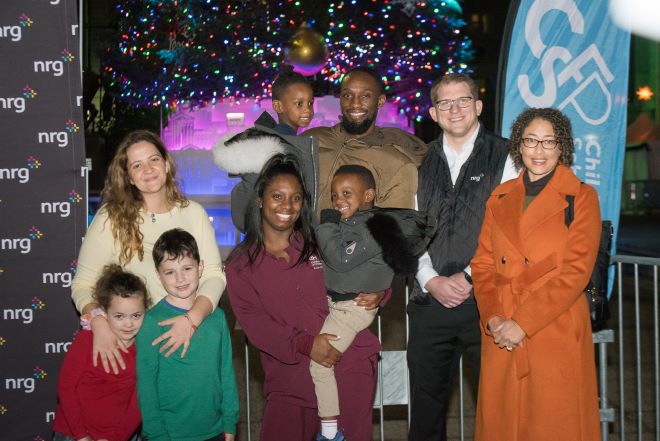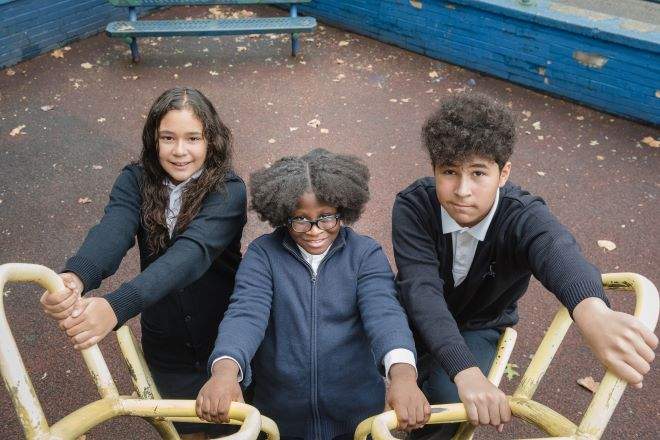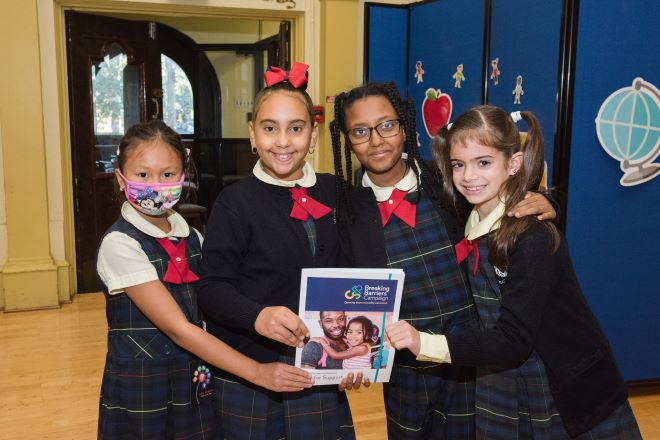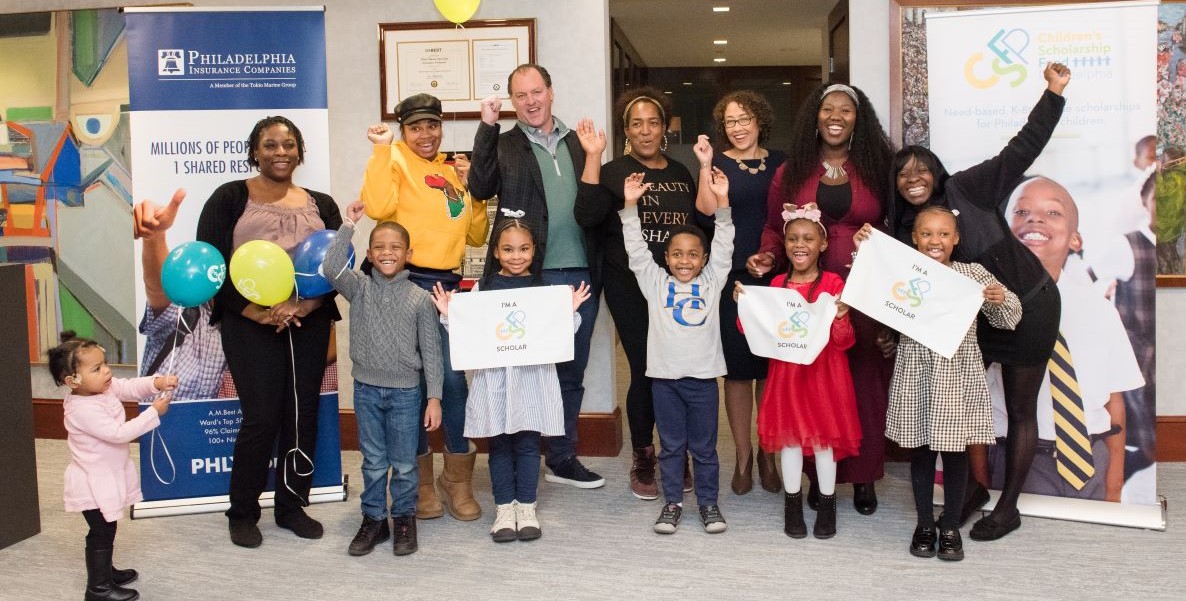When Tammie Tilson was growing up in Mt. Airy, her father insisted she attend a private Catholic school through 8th grade. After that, she could choose if she wanted to go to a public or private high school.
She chose public. More than a decade later, she still questions that decision. In some classes, books were in short supply, requiring students to share. A college-prep math course began with concepts she’d learned years earlier. Her new classmates seemed more likely to disrespect teachers and fight in class than her old schoolmates.
Now a parent, Tilson said that experience, combined with her strong faith, are the primary reasons she wanted her three children to attend Catholic schools. She and her husband wouldn’t be able to afford that without yearly financial support from the non-profit Children’s Scholarship Fund Philadelphia (CSFP).
“Parents want to be able to choose schools that are best for their children no matter what their income or their neighborhood,” Jordan says. “There is very much a need for other options.”
“A lot of people say, I can’t afford Catholic school,” says Tilson, whose three children attend St. Raymond of Penafort Catholic School. “I say, Me either. But here I am. Let me tell you how.”
CSFP is about school choice, but not the type of school choice that’s in the news again after Florida Gov. Ron DeSantis last week signed a universal school choice law. CSFP exists to help families who want to send their kids to private schools, but won’t be able to do so without financial assistance. The program does not receive money previously dedicated to public education. Instead, it’s funded by two state tax credit programs.
“We try to stay in the lane of helping families who raise their hand and say, I want something different. Right now, I don’t see my neighborhood school as an option for my child,” CSFP President/CEO Keisha Jordan says. “We support families who, without us, would have no other option.”
The best option — no matter the neighborhood
CSFP is an offshoot of the Children’s Scholarship National, an organization founded in 1999 with the aim of awarding 40,000 K–8 scholarships nationwide. It began operating as a separate non-profit in 2001 in response to soaring demand in Philadelphia. The majority of its funding comes from two state-level tax credit programs that allow businesses and private individuals to pay in with the promise of tax relief later. CSFP also receives grants from nonprofits and private donations. In 2021, that worked out to $6 million and $4.5 million, respectively.

To qualify for CSFP, families must be able to say “yes” to the following questions:
-
- Do you live in Philadelphia?
- Do you have a child or children entering grades preK4 through 8?
- Do you meet our income requirements? (Household income eligibility changes based on the number of people in a home. For the 2023-24 academic year, a family of four needed to earn $73,864 or less to apply.)
Qualified candidates are then entered into a blind lottery, although siblings of current CSFP students are given preference. Families can have up to three children receiving scholarships at the same time.
“Some families apply year after year and don’t get it,” Jordan says. “I would love to provide a scholarship to everybody who applies to the lottery, but for now our goal is continuing to support the students we have now.”
Demand for scholarships has increased every year. About 80 percent of CSFP students attend schools that cost $6,000 or less per year; 4 percent attend schools that cost $12,000 or more annually.
“I fall into that category where we’re above poverty, but we’re so not rich,” says Tilson, a single mom who works at a law firm.
During the 2022-23 academic year, CSFP received more than 8,000 new scholarship applications, which were then put into a random lottery. The organization ultimately awarded 2,000 grants of up to $3,200 each to students in grades preK4 (that is, the year before kindergarten) – 8th grade for tuition at 160 CSFP-approved schools, which include religious, single-sex and subject-focused institutions. About 3,800 students who were already in the program also received grants for a total of 5,800. About 75 percent of the scholarship recipients come from neighborhoods where the public schools are considered “low achievement” by state measurements.
In May/June 2022, CSFP asked parents to evaluate the program and their experiences with it. More than 80 percent of families who responded rated their school experience as excellent or above average. About 95 percent of respondents said the scholarship lessened financial stress and that they felt their children were prepared for the next school year.
That is borne out in the stats: Looking at the graduating class of 2021, CSFP says 99 percent of its scholarship recipients graduated from high school on time and 66 percent enrolled in a post-secondary education program within one year. In contrast, the Philadelphia School District says 75 percent of students graduated on time. Looking only at students with similar household incomes, the District reports 45 percent of those graduates continue on to post-secondary education. Nationally, less than 30 percent of students from similar household incomes choose to pursue higher education.
“Parents want to be able to choose schools that are best for their children no matter what their income or their neighborhood,” Jordan said. “There is very much a need for other options.”

No time to wait
Tilson’s oldest, Jordan, 9, is a fourth grader who got his first CSFP scholarship as a kindergartener. Her 5-year-old twins, Jade and Jaden, received their first scholarships last year in preK4 and will continue to receive that support until they go to high school.
“I fall into that category where we’re above poverty, but we’re so not rich,” says Tilson, a single mom who works at a law firm. Because of CSFP’s help, Tilson says she uses any “extra” cash to pay for her children’s outside activities: Basketball and soccer for the boys, competitive gymnastics for Jade.
“I do all I can. I’ll say, I don’t know how I’m going to do this, but I’m going to make it happen,” she says.
Tilson is a CSFP parent ambassador, meaning she’s a resource for others already in the program and those who want to be a part of it. Each year, she says, she welcomes 60 new scholarship families to St. Raymond, where annual tuition depends on family income. During the 2022-23 school year, 195 St. Raymond students received scholarships, according to CSFP.
Education advocates have long decried how the state funds public education, calling it rife with inequalities. This concern was confirmed in February when a Commonwealth Court judge ruled Pennsylvania’s school funding system violates the state constitution because it does not provide a “thorough and efficient system of public education” for all K -12 students. In part this is because a large portion of school funding comes from property taxes, meaning children living in less wealthy districts — including Philadelphia — do not receive the same resources available to students living in wealthier districts.
It is not currently known how or when the court’s ruling will change the public school funding system, or what effect that will have on neighborhood schools. But the district has big needs: It launched the 2022-23 in-person school year with a pronounced teacher shortage. The average school building is 73 years old, with many needing updates and repairs, including asbestos remediation, that some estimate will cost $10 billion.
There are also academic needs: Using the standardized Pennsylvania System of School Assessment tests as a measure, the district in 2022 saw a decline in the percentage of its students with math and reading scores considered “proficient or better.” Third grade reading scores — which lawmakers often use as a standard to evaluate schools — also fell, with 28.2 percent of city third graders scoring “proficient or better” in 2022 versus 32.5 percent in 2019.
Parents like Tilson say they don’t have time to wait for their local public schools to improve.
“We think all children should receive the same education, but we know that’s not the case,” Tilson says. “Children in the same city get different levels of education and have different resources.”
“We’re all just trying to do our best.”
Acknowledging that demand for scholarships exceeds supply, CSFP late last year launched its Breaking Barriers campaign with a goal of raising $100 million in five years. With that amount, CSFP’s data shows it will be able to serve an additional 2,000 students each year for a total of 7,700 new and existing recipients. The fund-raising effort got an early boost in March when the Hamilton Family Charitable Trust said it would give CSFP $1.5 million for the next three years, with a challenge for others to match its annual $500,000 commitment. The Trust has supported CSFP for 20 years.

CSFP also made three significant changes to its program that, when they go into effect for the 2023-24 academic year, will allow more families to apply: It addressed inflation by raising the maximum household income requirement; set three scholarship levels, including a minimum of $1,200; and removed the four-year limit on scholarships, offering to support students through their 8th-grade year.
The later was prompted by CSFP research that found families weren’t applying for the program because of the four-year limit. Under the old process, families would reapply for scholarships after four years and again be entered into a random lottery. Parents thought that was too risky, fearing they’d have to uproot their children if they were only able to afford private schools with CSFP’s assistance.
“We were creating a false barrier for parents,” Jordan says. “If we can get kids to 8th grade, they’re achieving amazing things.”
“Every parent can’t afford to pay for the bulk of a private school education and we need help like other parents,” she says. “We’re all just trying to do our best, making sure our kids are happy, healthy and safe.”
CSFP families choose to send their children to private schools for different reasons, with safety and academic concerns the two most often cited.
“I wouldn’t send my kids anywhere I didn’t feel comfortable them being without me,” says Shante Woodlin, whose two children attend The City School-Fairmount, which is Christian-affiliated. CSFP currently gives scholarships to 242 students at The City School, where tuition for full-time students is $10,680.
Woodlin, a stay-at-home mom whose husband runs his own business, says her children are doing well academically as well as socially, and she’s happy their education has a spiritual side.
“Every parent can’t afford to pay for the bulk of a private school education and we need help like other parents,” she says. “We’re all just trying to do our best, making sure our kids are happy, healthy and safe.”
Melissa Pagano, a paralegal, sends her two school-aged children to Our Lady of Hope, the same elementary school she’d attended. (It was called Epiphany of Our Lord School then.) One of her favorite former teachers is now the school’s principal.
“About 95 percent of the staff were there when I was a student, so it feels like family. You feel you can trust them,” she says.
Pagano’s children began receiving scholarships two years ago. She entered the lottery multiple times before her name was drawn. “I just kept applying and I eventually got it,” she says. CSFP says 138 Our Lady of Hope students receive scholarships. As a CSFP parent ambassador, Pagano welcomes each new family to the school and helps others apply for the first time.
“All of the parents – I talk to them on the phone, we email, see them at school – they’re all very excited and grateful,” she said.
Pagano said she never considered public schools for her children and was always “100 percent” committed to a Catholic school. She said she would have done whatever was necessary to do so and is thankful CSFP’s help means she doesn’t have to.
Says Pagano, “I’d sell my soul to the devil for Catholic school.”
![]() MORE COVERAGE OF EDUCATION IN PHILLYMFROM THE CITIZEN
MORE COVERAGE OF EDUCATION IN PHILLYMFROM THE CITIZEN
Photo courtesy CSFP





